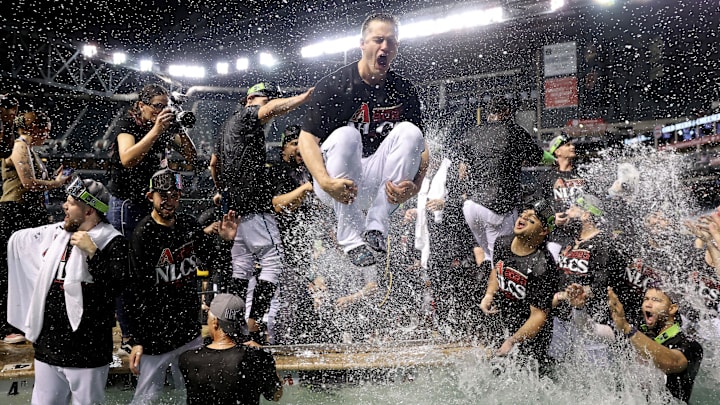Takeaway 2: A Connected Diamondbacks Team is a Dangerous Team
We heard it in manager Torey Lovullo's Wild Card postgame speech. "A connected team is a f---king dangerous team. We are f---king dangerous."
(WARNING: Explicit Language)
This is my manager. I don’t care, I don’t care, I don’t care.
— Alex D’Agostino (@AlexDagAZ) October 5, 2023
This is my skipper 🇮🇹 #Dbacks pic.twitter.com/SoW5zY6JnN
But what does this mean, really? Obviously, the camaraderie and brotherhood in the clubhouse is strong. We see that in their postgame celebrations and interviews, but how does that manifest on the field?
What this connected team does is pick each other up to go the distance. At the dark point of the season, it felt as if every time a player or group got hot, someone struggled enough to negate it. In the postseason, this has flipped entirely.
When Brandon Pfaadt, and, to a lesser extent, Zac Gallen struggled early in the Wild Card, their team came through for them. The defense--powered by Longoria and Perdomo--limited the damage as best they could, the offense erased three and two-run deficits and the bullpen pitched 9.1 scoreless innings. When Ginkel struggled, Saalfrank got him out of the jam.
Game 3 of the NLDS illustrated this point as well. Corbin Carroll and Tommy Pham, two of the offense's top performers in the postseason, went a combined 0-7, but Geraldo Perdomo, who had only collected one base hit so far, and had only 6 homers on the year, began the scoring rally with a solo shot off Lance Lynn, snowballing into a 4-0 lead from three more homers.
When Ryan Thompson, who has been stellar as a Diamondback, allowed four hits and two runs in the seventh, Saalfrank got him through the inning, while Ginkel and Sewald took it the distance, through the heart of the Dodgers lineup.
I’ll say it again:
— Alex D’Agostino (@AlexDagAZ) October 12, 2023
FIRE IN MY BLOOD, GINKEL. pic.twitter.com/ZTRF0jQpmY
The team continues to step up when their teammates need them, and the connection between these young players and the veterans is demonstratively strong. Lovullo is right, a connected team is a dangerous team, and the Diamondbacks are dangerous.
